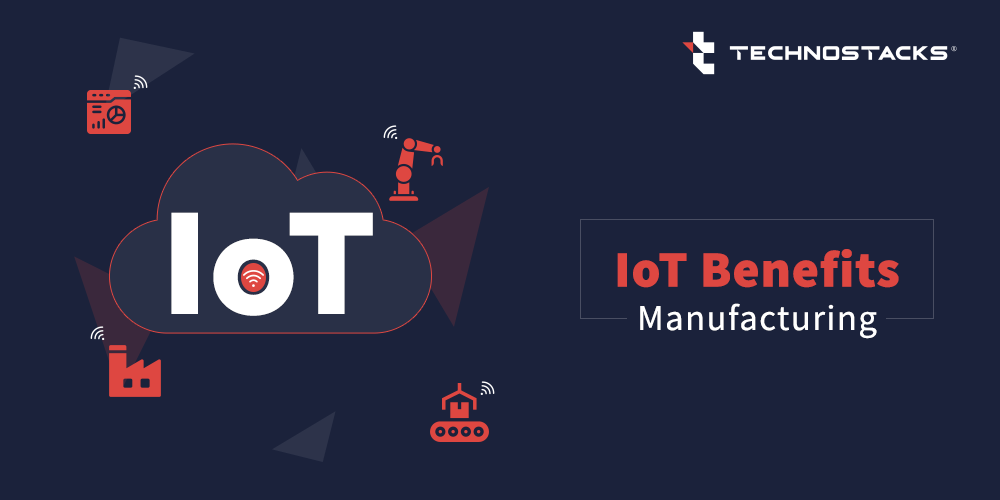Benefits Of Industrial IoT Implementations in Manufacturing
The growth of technology in recent years continues to reach its peak as more and more ideas and innovations join this field every day. One major part of this growth is the development of the Internet of Things. Yes! It has completely changed the manufacturing industry.
As overestimated as it may sound, but it has made possible things that we couldn’t even imagine 2-3 decades ago. To give you an idea of what IoT can do, let’s take a look at how technology has evolved around us and how it leverages manufacturing.
As a result of IoT applications, today, we have connected appliances, IoT home automation, advanced autonomous farming equipment, wearable health monitors, smart factory equipment, ultra-high-speed wireless internet connections, and these applications are just the tip of the glacier.
This long list of developments and amazing facts of custom IoT apps is the reason why IoT has taken over the industry in such a short time. From simple everyday tasks to complex manufacturing tasks, IoT has considerably changed many aspects of our everyday life. It has become and turned as the major cause of the digital revolution in the manufacturing industries and benefits the businesses.
As stated by IoTanalytics.com, the number of IoT-active devices used in different industries is estimated to reach 22 million units by the year 2025. And why wouldn’t industries want to integrate the devices that make their work so much easier?
Custom IoT apps bring along a whole ton of advantages including advanced manufacturing automation systems and optimized production processes which help in increasing revenue and decreasing expenditures in the long run.
Owing to all these advantages the IoT market share is expected to rise exponentially in the upcoming years. According to a source, the industrial IoT market size is expected to reach up to $124 billion by the end of 2021.
Similar to all other fields, IoT has shown wonders in the field of manufacturing. Advanced manufacturing solutions benefit both the manufacturers and consumers.
IoT-enabled devices are capable of better observations and advanced research. The results from these researches could be utilized to obtain precise estimations of consumer needs, and thus manufacturing processes can be upscaled or downscaled accordingly. This will also help in reducing manufacturing waste.
Among the many other benefits of IoT in manufacturing, a few important ones are –
- It allows easy optimization of devices and equipment.
- Advanced predictive maintenance and enhanced forecasting.
- It reduces downtime and ensures faster delivery of services.
- Cognitive operations allow the industries to improve production quality.
- It allows better allocation of machines and resources and minimizes all types of wastes.
Right now, most manufacturing companies utilize custom IoT app services for facility and asset management, security operations, logistics, and customer servicing. All these services are the future of smart and advanced manufacturing solutions and therefore prove to be of great importance in the industry.
Having seen a brief outline of how IoT works for the manufacturing sector, we should now take a look and discover the best ways in which IoT has been employed in the manufacturing industry.
- Predictive Repairing and MaintenanceIn large manufacturing plants, maintenance of equipment could be really time-consuming and difficult. However, what if we tell you that an IoT integrated device would automatically send alerts when it needs maintenance.This is made possible by connecting IoT-enabled devices having different sensor points (such as temperature, vibrations, currents, etc.) with other devices, IFTTT responses, or APIs and obtaining essential maintenance data.The data obtained from IoT integrated machines helps manufacturers keep track of the condition of machinery and determine when a machine needs maintenance. This way, they can activate the repairing process before any harm is done.
Maintenance of machinery becomes an automated practice and becomes much easier. More importantly, it helps reduce maintenance and repair costs as the maintenance alerts help in timely maintenance and repairing of equipment.
- Asset and Inventory Tracking
At this point, it may be clear that using sensors, IoT-enabled devices could be excellent trackers. Therefore, in many manufacturing industries, IoT integrated machines are used for inventory management and tracking.Asset management is also widely practiced in manufacturing industries in the modern-day scenario. All you need to do is to develop a native web or mobile app and combine it with Industrial IoT technology. This will help you obtain real-time asset information and make informed, reasonable decisions.The exact meaning of asset management is to keep an eye on the crucial assets of the entire manufacturing process. For example, it enables them to oversee the components of the supply chain which include raw materials, containers as well as finished goods. IoT-enabled asset tracking helps the manufacturers to calculate the time utilized by movable equipment to complete a task. By knowing this, measures can be taken to reduce the idle period, and better utilization of equipment can take place. - Improved Product QualityOne of the major IoT impacts on the manufacturing sector is the enhanced product quality. Most of the time, manufacturers compromise the quality of a product owing to high manufacturing costs associated with a high-quality product.Even a slight change in the quality of a product can cause a huge rise in manufacturing costs. Therefore, even though a high-quality product can increase sales and improve customer satisfaction, producing one may not sound very economical to the manufacturers.Implementing IoT could help you solve this problem. How? Let’s see what the main causes of poor product quality are in diverse cases. One reason could be the faulty equipment that is not calibrated properly.
Another reason could be that many tiny details in the manufacturing process go unnoticed as long as the final product looks good. In an IoT-enabled system, the sensors will detect even the tiniest of faults and send alerts for repair. This will prevent the equipment from failing and will help in producing high-quality products.
- Reduced Downtime and Swifter DeliveryManufacturing high-quality products is not enough for consumer satisfaction. The production needs to be completed on time and with minimal defects, wastes and losses.In a manufacturing plant, every piece of equipment is part of a network, and a delay at any stage means a delay in the entire manufacturing process. This may lead to wastage of both time and raw materials.IoT can help manufacturers avoid such problems. If the equipment could be integrated with sensors, then it will send alerts when the equipment needs maintenance, or its performance is declined. Detection of faults and problems at an early stage will help you avoid poor product finish and minimize losses.
Key Takeaways
We can conclude that custom IoT apps and systems can prove to be very effective in today’s manufacturing processes. However, you would need solid expertise to get IoT implemented into your business if you truly want to see results.
Are you confused about which IoT company to go to? Don’t worry at all you have landed at the right place.
Technostacks is a global IoT app development company and has extensive experience in IoT hardware, firmware development, and building custom IoT apps. Our teams have delivered effective IoT solutions and products for the manufacturing sector. We also offer IoT product testing services globally.
Connect with us for more information and share your project requirements.








